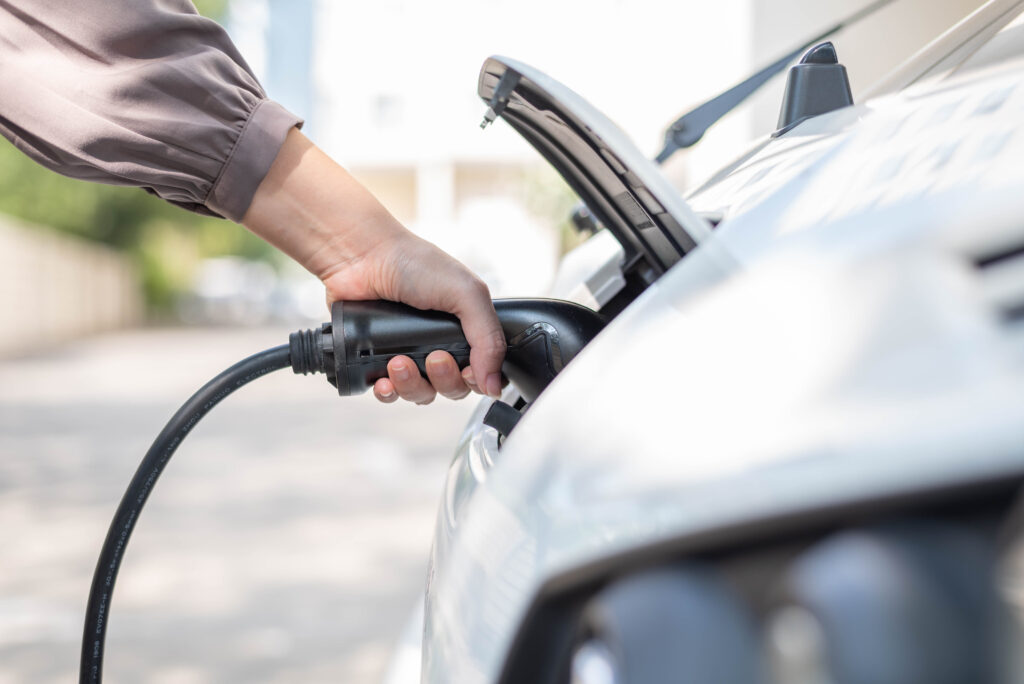With an eye on finances and our impact on the environment, making the choice to have an electric car can help you save money and reduce your carbon footprint. Electric vehicles are a very attractive option, largely due to their lower running costs and the widening choice of models available. Charging your electric vehicle will be a necessity and being able to do that from home is a practical and economical choice. In this article, we look at all you need to know about electric vehicle chargers.

What is an EV Charger?
In the same way that your phone, tablet, or other electronic device needs charging to keep the battery full, both electric vehicles and plug-in hybrid electric vehicles need an EV charger for the same reason. At the simplest level, the EV charger pulls an electrical current from either a 240v outlet or the grid to supply electricity to the vehicle. Chargers fall into two categories – either trickle or AC.
Which EV Charger Should I Choose for My Home?
- A trickle charger will plug into the mains supply of your property using a standard, 220v 3-pin plug. This type of charger can deliver anywhere between 8-10 miles of range to the battery per hour. Bear in mind that they can take anywhere from 12 – 24 hours to fully charge a battery pack so perhaps should only be considered if you drive short distances every day or can carry out a top-up every night. Although these can be plugged directly into a 3-pin socket it would be best to have a qualified electrician to look over your electrics to ensure that the circuit can deliver the power needed.
- AC chargers (or ‘Wallboxes’) have power outputs of 3.7kW or 7kW. The 7kW option will charge most electric vehicles from empty to full range in around 8-10 hours. This is likely the best option for most electric vehicle owners due to the speed of the charge.
If you have a commercial setting that has a 3-phase power supply, then 22kW (DC) electric car chargers can be installed which offer a speedier charge time.
You might have seen or heard of fast chargers for electric vehicles, taking the battery from empty to nearly full in a speedy 40 minutes. However, these are generally only seen at public charging points due to their very high installation cost and the level of power consumption, rendering them uneconomical for homes and most workplaces. The power output required is more than most homes can safely provide.
EV chargers are either supplied tethered – that is the cable is attached to the wallbox permanently) or untethered (the cable is like an electrical cable that you would take camping, that plugs in either end). There are advantages and disadvantages to each. This article provides a good balanced view of the pros and cons of each.
What Are the Likely Costs?
Purchase: There will naturally be variations in price but typically a home or workplace electric car charger will start at around £400 to £500. This can progress up to figures around £4000, all depending on the power output and features of the charger. Buying a charger at the lower end of the scale, savings of around £1000 over a year can be seen with a home charge point, rending them an economical and practical option too. A Government grant, known as the OLEV Grant, is available to provide up to £350 worth of support towards the cost of an EV charger. You will need to have off-street parking to qualify. Further details can be found here.
Installation: Your electric car chargers must be installed by a professional electrician or an OLEV approved installer – this is an additional cost to consider and obtaining a quote for this will be necessary.
As EV chargers can withstand the weather, typical sites include the side of the house, on the driveway or in the garage. The length of the charge cable is generally between 5 and 10m long so this will need to be taken into consideration when siting the charger.
Do I Need to Obtain Permission to Install an EV Charger?
There are a few circumstances under which you will need to obtain permission to install an EV charger. These are if the charger is:
- more than 1.6m high
- over 0.2 cubic meters
- to be installed near a highway
- being installed on or in a listed building
Bear in mind that you should seek permission to install an EV Charger from your landlord in commercial or domestic rented properties.
EV Chargers for the Home
The Government has announced that all new homes will require EV chargers from 2022.
With electric cars becoming more and more popular, having a charger installed in your home will make it more attractive to buyers, the Express reports that EV chargers can increase the value of your home by up to £5k. Now there is an incentive!






